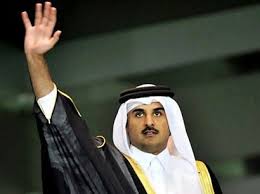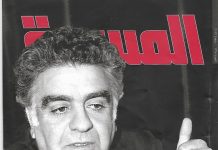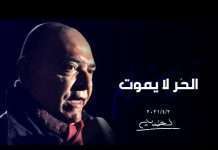قطر والدور الذي كان
غسان شربل/الشرق الأوسط/29 أيار/17
حاولت أن أفهم الأزمة الجديدة في العلاقات القطرية – السعودية، وهي أيضا أزمة في العلاقات القطرية – الخليجية. في الحساب المنطقي لقطر مصلحة فعلية في أن تكون عضواً طبيعياً وفاعلاً في مجلس التعاون الخليجي. وما حدث في السنتين الماضيتين أوحى أنها أعادت النظر في السياسات التي قامت على تظهير الخلاف والمشاكسة والسباحة ضد التيار الغالب في المحيط الذي تنتمي إليه. ولا غرابة أصلاً أن تسعى دولة إلى توسيع دورها وتعزيزه، خصوصاً إذا امتلكت أوراق قوة مالية وإعلامية تستطيع التأثير في مواقف الأطراف أو الدول أو الرأي العام. والدول هنا تشبه الأفراد أحيانا. تذهب بعيداً في الأحلام إلى حدّ السقوط في الأوهام، وتتعلق بدور كبير لعبته حتى ولو تغيرت الظروف التي كانت تسمح.
ولأن الحاضر لا ينفصل عن الماضي القريب قلت أرجع إلى أوراقي وما سمعته أو نشرته. دى اندلاع الثورة في ليبيا انهمكت بصفتي صحافياً في جمع الروايات عن عهد معمر القذافي المديد، والتقيت عدداً ممن كانوا إلى جانبه منذ البدايات حتى اندلاع الأحداث، سواء في الخيمة أم الحكومة أم مجلس قيادة الثورة.ما يعنيني هنا هو بعض ما جاء في حوار طويل أجريته في فبراير (شباط) 2014 مع رئيس الحكومة الليبي السابق، محمود جبريل، ونشر على حلقات في الزميلة «الحياة».
قال جبريل إن قطر التي أمدّت الانتفاضة الليبية بالمال والسلاح راهنت منذ البداية على الإسلام السياسي، وبذلت جهوداً استثنائية لتنصيب عبد الحكيم بلحاج قائداً لثوار ليبيا. وبلحاج هو الأمير السابق لـ«الجماعة الإسلامية الليبية المقاتلة» شارك في القتال بأفغانستان واعتقله الأميركيون وسلّموه إلى القذافي وبقي في السجن حتى 2010. وأكد جبريل أن قطر أخرت موعد اندلاع الانتفاضة في طرابلس ليتسنى لبلحاج الوصول إليها وبهدف تكريس دوره القيادي. وروى أنه غادر اجتماعاً ثنائياً كان يعقده مع ولي عهد قطر الشيخ تميم لأن الأخير انشغل عنه بمتابعة مشاهد كانت تبثها قناة «الجزيرة» لوصول بلحاج إلى ثكنة باب العزيزية في طرابلس. روى جبريل أيضا حادثة بالغة الدلالات. قال إن مؤتمراً لأصدقاء ليبيا عقد في باريس في سبتمبر (أيلول) 2011، وانتهى اللقاء بمؤتمر صحافي شارك فيه نيكولا ساركوزي وديفيد كاميرون والشيخ حمد بن خليفة وجبريل ومصطفى عبد الجليل.
وقال جبريل: «سألني أحد الصحافيين الآن وقد سقط النظام ماذا ستفعلون بهذه الأسلحة المنتشرة؟ فقلت إن لدينا خطة لاستقرار طرابلس ولجمع الأسلحة وشرائها. قاطعني أمير قطر أمام الجميع، وقال: الثوار لا يلقون السلاح أبداً، الثوار هم الذين لديهم الشرعية. وكان ذلك طبعاً محرجاً وغريباً».
ملف ثانٍ. في الأسبوع الأخير من مارس (آذار) 2009 وقبل يومين من توجهه إلى القمة العربية التي عقدت في الدوحة، أجريت حواراً مع الرئيس علي عبد الله صالح. قال صالح: «الوساطة القطرية انتهت، وهي للأسف شجعت الحوثي على التمادي وأن يجعل من نفسه نداً للدولة وهذه كانت من الجوانب السلبية التي وقعت فيها الحكومة اليمنية». الظروف التي سمحت لقطر بالقيام بالأدوار المشار إليها تغيرت. لم يعد هذا الدور ممكناً. الحريق السوري مفتوح ومعه التوتر السني – الشيعي. أميركا ترمب لا تشبه أميركا أوباما. أولوياتها في المنطقة شديدة الاختلاف. خطاب ترمب في الرياض مغاير لخطاب أوباما في القاهرة. لم تعد واشنطن تراهن على احتواء «القاعدة» عبر تسهيل وصول «إسلاميين معتدلين» إلى الحكم. لم يعد «الإخوان» خياراً وارداً أو مقبولاً. ولم تعد قطر قادرة على لعب دور الوسيط في هذا المجال. موقف إدارة ترمب من إيران واضح هو الآخر؛ لا تعتبر توقيع طهران الاتفاق النووي مكسباً أميركياً استثنائياً. إدارة ترمب تدعو إلى عزل إيران وتدين سياستها في الإقليم وتحديداً في العراق وسوريا ولبنان واليمن. تشترط للتسليم بالحل الروسي في سوريا أن يقلص نفوذ إيران وينهي دور الميليشيات التابعة لها. وفي هذا المجال لا يتسع المجال لوساطة قطرية.
تغيّرت المنطقة. قمم الرياض أظهرت أين تقف الأكثرية العربية والإسلامية من الإرهاب والتطرف وسياسة زعزعة الاستقرار الإيرانية. والعلاقات السعودية – الأميركية دخلت مساراً جديداً مختلفاً. ومصر تغيرت وكذلك اليمن.
ليس سهلاً على الدول أن تسلم بأن ما كان ممكناً لم يعد. عنادها يشبه أحياناً تعلق الأفراد بصور قديمة. لكن الأكيد هو أن علاقات قطر مع محيطها الطبيعي لن ترجع طبيعية ومستقرة إلا إذا أجرت مراجعة عميقة، وسلمت بأن الدور السابق صار متعذراً، وأن مصلحتها الفعلية هي في العودة إلى حدود الدور الطبيعي.
Qatar and The Role that was
Ghassan Charbel/Asharq Al Awsat/May 29/17
I tried to understand the new crisis in Qatari-Saudi relations, which is also one in Qatari-Gulf relations. Based on a logical calculation, Qatar has an interest in being a natural and effective member of the Gulf Cooperation Council. Developments over the past two years have suggested that the country has reconsidered policies based on the endorsement of disputes, trouble-making and moving against the current.
It is not surprising to see a state seeking to expand and promote its role, especially if it has a strong media and finances that allow it to influence stances, countries and the public opinion. States can sometimes resemble individuals to a large extent. They get caught up by dreams to an extent that they may fall into illusions. They become attached to the major role that they are playing, even if the circumstances of such a role changed. Since the present cannot be separated from the recent past, I decided to skim through my papers and review what I heard or published.When the revolution broke out in Libya, I was engaged, as a journalist, in collecting stories on the long era of Maammar Gadhafi, and met a number of people who accompanied him from the early beginnings until the outbreak of the conflict, whether in his tent, his government, or in the Libyan Revolutionary Command Council.
The following are excerpts from a long interview that I conducted in February 2014 with former Libyan Prime Minister Mahmoud Jibril, which was published in sequences in “Al-Hayat” newspaper. Jibril said that Qatar, which provided the Libyan revolution with cash and weapons, has been betting from the beginning on political Islam and has exerted exceptional efforts to appoint Abdul Hakim Belhaj as the commander of Libyan revolutionists. Belhaj is the former “emir” of the Libyan Islamic militant group. He has fought in Afghanistan and was arrested by the Americans, who handed him over to Gadhafi. He remained in jail until 2010. Jibril stressed that Qatar has intentionally delayed the eruption of the revolution in Tripoli to wait for Belhaj’s arrival to the Libyan capital in order to be crowned as the coup leader.
The former prime minister added that he had to leave a bilateral meeting with then Qatari Crown Prince Sheikh Tamim, because the latter was too busy watching the arrival of Belhaj to Bab al-Azizia barracks in Tripoli, which was broadcast by “Al-Jazeera”. Jibril also recounted a very significant story. He said that a friends of Libya conference was held in Paris in September 2011. The meeting ended with a joint press conference, with the participation of Nicolas Sarkozy, David Cameron, Sheikh Hamad bin Khalifa, Jibril and Mustafa Abdel Jalil.
Jibril said: “One of the journalists asked me: Now that the regime has collapsed, what will you do with the existing weapons? I replied that we had a plan for Tripoli’s stability and for collecting and buying the weapons. The Qatari emir interrupted me in front of everyone and said: ‘Revolutionaries never lay down their arms. Revolutionaries are the ones who enjoy legitimacy’.
That was of course embarrassing and strange.”The following is another important issue. In the last week of March 2009, I conducted an interview with President Ali Abdullah Saleh, two days before his departure to Doha to participate in the Arab Summit. Saleh said: “The Qatari mediation is over. Unfortunately, they are encouraging the Houthis to go far and consider themselves as the State’s opponents. This has been one of the negative aspects into which the Yemeni government has fallen.”
Circumstances that allowed Qatar to assume the abovementioned role have changed. This role is no longer possible. The Syrian war is raging, along with tensions between the Sunnis and the Shi’ites. Donald Trump’s America is not similar to Barack Obama’s America.
Its priorities in the region are widely different. Trump’s speech in Riyadh is different from Obama’s address in Cairo. Washington is no longer counting on containing al-Qaeda by facilitating the arrival of “moderate Islamists” to power. “The Brotherhood” is no longer a possible of acceptable choice. Qatar is no longer able to have a mediatory role in this regard.The Trump Administration’s stance towards Iran is also clear. It does not consider the nuclear deal with Tehran as an exceptional US gain.
The Trump Administration calls for isolating Iran and condemns its policies in the region, in particular in Iraq, Syria, Lebanon and Yemen. In order to accept the “Russia solution” in Syria, the US requires Moscow to curb Iran’s influence and to end the role of Iranian-backed militias. In this context, there is no room for a Qatari mediation. The regional landscape has changed. The summits held in Riyadh have highlighted the stance of the Arab and Muslim majority towards terrorism, extremism and Iran’s destabilizing policies. Saudi-US relations have taken a new different path. Egypt has changed, as well as Yemen.
It is not easy for a country to accept that what was achievable before is no longer possible now. Its stubbornness reminds us sometimes of a person’s attachment to an old photo. What is certain is that Qatar’s relations with its natural environment will never be normal and stable again, unless the Arab state thoroughly reconsiders its stances and acknowledges that its old role has become unachievable and that it has a real interest to return to the limits of a normal role in the region.





















